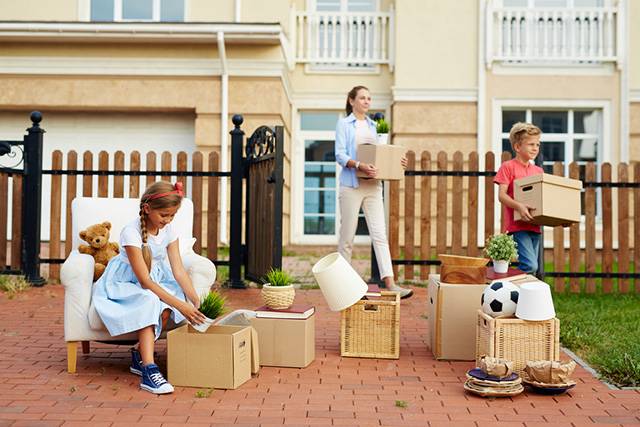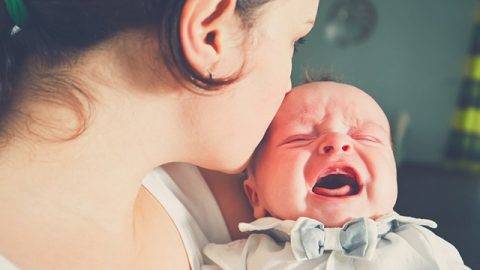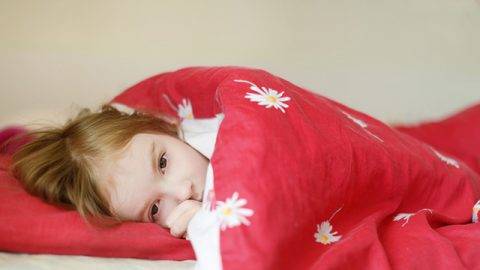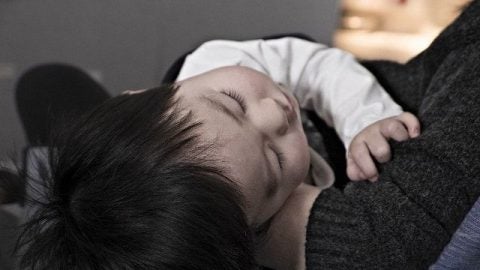Moving is tough on everyone, take it from someone who did it a year ago. My family moved just a mile down the road from our old house and it was the only home my children knew. Moving from place to place, especially if you do it frequently, can greatly affect children and how they sleep.
Getting them to sleep in their known home can be difficult enough, so imagine how tough it could be in a new home. Since I know a little about this, I want to share with you how moving can affect a child’s sleep and what you can do to make it easier on them and you.
There’s really no magic number, but not getting enough of it can really have an impact on a child. Here’s an article that talk about The Relationship Between Children and Sleep.
#1. The Effect On Babies
When it comes to moving, the toughest thing that babies go through is the break in routine. Usually, they do the same things at the same time of the day. So naturally, if you’re busy moving and don’t stick to that routine, they may miss a nap or their bedtime. This can completely throw off a baby’s cycle and may lead to sleep disturbance or waking up frequently.
You might be interested in: The Surprising Health Benefits Of Napping
— Unfamiliar Surrounding
Once you have actually made the move and you go to place your baby down for their bedtime, the unfamiliar surrounding can cause them to completely refuse sleep. So don’t use the move as an excuse to redecorate because this may only add to the unfamiliarity of the room.
— Noises
A new home means new noises. When I moved into my new house with my kids, we started to hear the new noises of the horses across the yard, something that wasn’t familiar to us. With babies, they tend to wake easier than toddlers sometimes, and new noises, such as animals outside or traffic, can cause them to wake up even more if they aren’t used to it.
— Time Zones
If you have decided to move cross country and have to change time zones, this can be particularly tough on a baby that has a set schedule. Changing time zones can lead to severe jet lag and even one or two hours can be tough on a baby.
#2. The Effect On Toddlers & Young Children
Young children can be very bold and refusing of new things. My kids absolutely hated to sleep in their new bedrooms because they weren’t their old rooms and they liked their old rooms, if you get what I mean.
Sometimes, it was easier for me to just let them bring a blanket into my room and sleep on the floor. Unfortunately, this was a little hard on my husband since he had to try to maneuver around the kids early in the morning. Unfortunately, this isn’t the only thing that can happen after a move.
You might be interested in: Helping Children With ADHD and Autism Get Better Sleep
— Nightmares
It’s a no brainer, but the nightmares that kids may have after a move can affect their sleep alot. They can also suffer from night terrors which are a more extreme version of a nightmare. My son experienced these after a stay in the hospital and he didn’t sleep for weeks. So imagine all of the stress of a move on top of these night terrors.
Night terrors happen during a deep sleep that isn’t REM sleep. It’s technically not a dream, it’s more like a reaction of fear that happens during the sleep phase transitions. During these dreams, a child may sit up suddenly, shout, scream, their breathing may be faster, they may have night sweats, they can act upset, thrash themselves around, and finally they’ll return to sleeping as if nothing ever happened.
So, if you are in the middle of a move or just moved and your child is acting strangely during their sleep, this could be the cause. Moving is definitely very scary on a child, especially if they aren’t aware of what’s happening.
— Not Sleeping Alone
Since children have such vivid imaginations, they can pretty much create any scenario in their heads. In the case of my daughter, she thought that since we were in a new home, the old owners were going to come back and try to take them. Yeah, it’s was pretty strange hearing her say that. She was then terrified to sleep alone. She didn’t trust the new home and she just wanted to be with people who she could trust-mommy and daddy.
Since they wake up so much or completely refuse to go to sleep all together, they may perform poorly in school or fall asleep in random places throughout the home because they’re so tired. It’s best to try to ease them into their new room slowly if they are having a problem with it. It may take a few nights and a lot of patience, but they’ll soon get over it and be sleeping in their own beds in no time.
#3. Side Effects Of Sleep Deprivation
Since toddlers and preschoolers need around 13 hours of sleep with 2 hours worth of naps, not getting these because of a move can have some severe effects on them. They can have a few of the following if they aren’t getting adequate amounts of sleep:
— What To Look For In Sleep Deprived Toddlers
- Hyperactivity
- Concentration difficulty
- Overly emotional
- Increased appetite
- Defiant behavior
- Difficult to wake up in the morning
- Tantrums
- Lack of patience
It’s understandable that moving is very stressful on children, so it’s best to know how to resolve it before it becomes a huge issue.
#4. The Effects On Teenagers
Yes, moving can certainly affect the sleep of a teenager, especially if they are moving to a new school. They may be worried about making new friends, how long it will take them to drive to the new school, they may be missing their old friends, and they can even miss their old bedrooms.
Teenagers make a lot of memories, and most of them with family is in their homes. I moved around quite a bit as a teenager and it certainly took its toll on me.
See relevant article here
— Obesity & Diabetes Risk
If a teenager is losing sleep, they are putting themselves at a higher risk for obesity, leading to diabetes. If a teenager already suffers from diabetes Type 1, they may have more trouble getting to sleep as it is. This causes difficulties with regulating blood sugar and controlling their behavior. It’s best that they try to control their sleep issues to avoid further health problems.
— Insecurity
A teenager is always working to establish their identity. When they move to a new location with new people and a new school, they may start to feel insecure and have bouts of anxiety. They may also have to start getting used to differences in clothing, social mores, and cultural changes. As they go to bed, they may lay awake at night worrying about how they are going to fit in or how they are going to get the money to buy these new clothes, leading to sleep deprivation.
— Sleep & Anxiety Medication Dependence
If these teenagers who are taking the move differently than others are having an issue sleeping or with anxiety, there’s a chance that they could turn to sleep or anxiety medications such as Ambien and Lunesta, which really aren’t approved for younger people.
A recent study showed that teens who were prescribed pills for sleeping or anxiety, were 12 times more likely to abuse those medications than teens who did not have a prescription. This is why sleeping pills aren’t ideal for teenagers.
#5. Making The Transition Better
Luckily for you, there are ways that you can make the transition more smooth for your child in preparation of the move. If you can better educate them on what is happening and why, they may take to the move better and sleep easier.
— Before The Move
Before you move, the best thing you can do is talk to them about it. If you wait until the last minute because you think it’ll be easier, you’re just making it worse. It’s going to stress them out even more if they are quickly being swept up and taken to somewhere new not knowing where their favorite toy is.
You can also do what I did with my kids- give them a tour. I actually have a video of the day we bought the house and we took the kids over to see it. We showed them their rooms, let them pick out where their beds were going to go, and it really did seem to help with the transition even though they did sleep with us for a few days.
— On Moving Day
On the day of the big move, there are a few things you can do to help them not miss their old rooms so much. If they miss their old rooms, they won’t want to sleep in their new ones. The best thing you can do is let them say goodbye to their rooms and the house.
— After The Move
After you have made the move, to make the transition a lot easier, is to unpack your child’s room first. This may make them feel like they are more at their old home. Set up their bed, toys, put their clothes away, and make it look like their old one. If it looks like their old one, they may sleep better.
Conclusion
As you can see, moving can greatly affect a child’s and a teenagers sleep. It’s important that everyone in the house gets adequate sleep so that they can perform their daily functions without disruptions from being tired. It’s also vital to children and teenagers so that they can perform normally in school. I was always the kid that was falling asleep in class and I almost didn’t graduate because of it.
So, if you want to ensure the move goes smoothly and your children aren’t losing sleep over it, follow the techniques above and look for signs of sleep deprivation so that you can help it as soon as it’s noticed. You can also do some great bedtime rituals to make sleeping in the new house easier. If you took a liking to this article, please share it with anyone you may know who is moving and has children.












